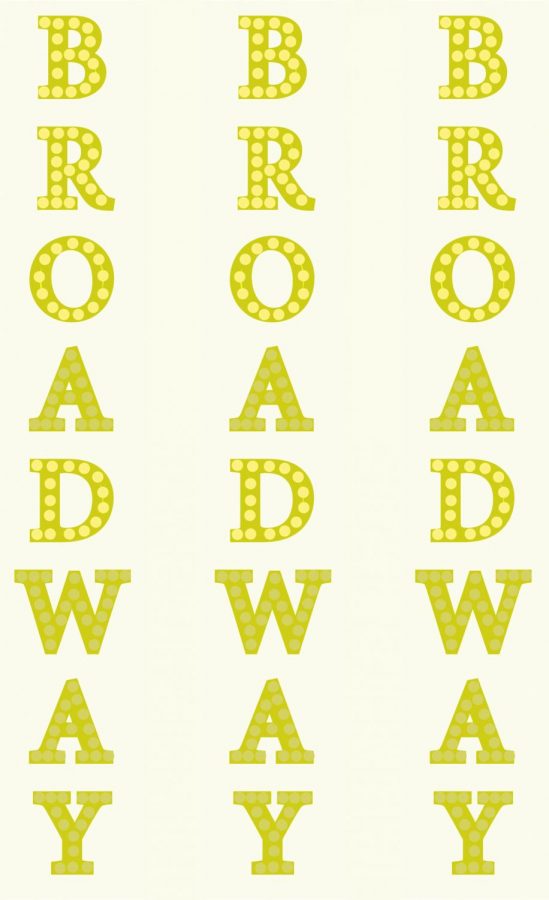Broadway is dark tonight, but not forever
October 6, 2020
As a resident of New York City for nearly 11 years, fall has always meant a return to bearable temperatures on the subway platforms and a surge of new and exciting Broadway shows.
While working on Broadway is lively most of the year, September begins an earnest effort to churn out new material as audiences begin scoping out the early contenders for this year’s Tony Awards.
Actors, stage managers and musicians go into rehearsal while sets and costumes are constructed by carpenters and wardrobe crews. Projectionists and lighting designers map out and create other worlds while choreographers harness movement into storytelling. All of these collaborations begin to culminate in a creative endeavor that people from across the world travel to New York City to enjoy. But 2020 brought all of that to a stop.
The first warnings to the disruption of the industry were stories of cruise ships like the Diamond Princess being quarantined in February. These vessels are not unlike Broadway theaters–hundreds of people willingly and excitedly purchase tickets to a shared experience in a confined space for an extended period of time.
Unfortunately for audiences and seafarers alike, that escape from reality is a luxury. As reports continued to come in about the growing number of infections aboard the Diamond Princess and other countries started to identify outbreaks, I began to notice an increasing number of masked audience members. New shows were announced to begin performances and school groups kept booking tickets, but I couldn’t help but wonder if I should start trying to save more.
March 10, I left work at the Ambassador Theatre with the expectation that “Chicago” would be playing another night to a thousand people like it had eight times each week for the last 23 years. The only interruption to that streak—aside from the odd snow or hurricane cancellation—was when all of America was stopped by the tragedy on Sept. 11, 2001. For two days Broadway went dark.
Though the comeback was not immediate, eventually Broadway returned stronger than before, and by 2019 had grown to contribute $14.7 billion to New York City’s economy.
But this time is different. Nearly 190 days have passed since Broadway theaters played their last shows, and almost as many have gone by since I last went to work in one.
Producers agreed to provide two weeks of additional salary and benefits to help bridge the gap in work. Since then, I and nearly 97,000 other theatre employees have had to rely on unemployment insurance or retirement savings to see us through this unprecedented disruption in our industry. As Washington fails to pass meaningful legislation to provide relief, it’s hard not to feel left out in the cold.
While the rest of the nation tries to cobble together a sense of normalcy by returning to work and school, Broadway leaders have been largely silent as reopening dates get pushed back and back again.
This leaves many former employees like me learning about the latest delays from press releases and headlines. With terms like pay cuts, concessions and crew reductions beginning to filter into the conversations around Broadway’s rebound, I recognize that some sacrifices will be necessary. The question remains, who are we sacrificing for? Why are we expected to give up salary for an industry that fails to acknowledge its members’ struggles?
Regardless of the challenges ahead, the Broadway community must be ready to face them together, but the pandemic is not the only issue we need to tackle. As evidenced by the strife in cities and towns across the country, there is a similar racial disparity in Broadway between its white and BIPOC members. While the industry has made efforts to highlight more work and performers of different backgrounds, there remains a lack of diverse representation in leadership roles and in positions of influence.
Thankfully, people in the industry are already taking charge in unions and by forming groups like the Black Theatre Coalition. They aim to draw attention to the lack of Black representation in the theatre community and create employment opportunities for our Black colleagues who have been oppressed and overlooked.
Though difficult conversations like this lie ahead, now is the time to have them. By facing our past mistakes in a time of crisis, Broadway has a chance to reemerge better than before. An acknowledgement of grievances and a unifying of minds will go a long way to restoring the heart of this industry when it’s safe to gather again. I can’t help but think that the same could be said in so many other areas of our lives in this country. Instead of focusing on petty divides, we owe it to our neighbors to listen and to empathize. Though our experiences and backgrounds may differ we all share this planet and each person is as valued and valuable as the next. Black Lives Matter. Trans women are women. Wear a damn mask.

























Pat Penn • Oct 13, 2020 at 8:01 am
Good for you,Geoff!